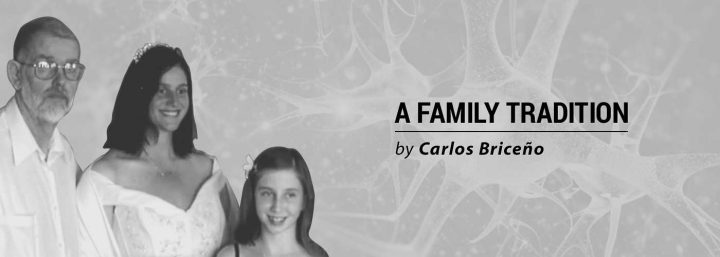The Story Behind My Family’s Habit of Saying, ‘I Love You’
Written by |

We live in a golden age of communication with many ways to talk to each other — email, text, and if you’re old like me, by phone. We have many chat choices, but I want to focus on one aspect by asking you a question: How do you end conversations with your loved ones?
In my family, we always finish every talk, text, and email with, “I love you.” You may think that we do that because my wife and daughter are gene-positive for Huntington’s, but the habit started long before their diagnoses. It began when I met Jill.
The first time I heard her say the words, “I love you,” she was finishing up a phone call with a close friend. Then I noticed that she said, “I love you” to everyone who mattered to her at the end of a get-together or a phone call. That might seem a little excessive to you — it did to me at first — but I soon learned the reason for her behavior.
When I asked Jill about her goodbye ritual, she told me a story. Years before we met, her younger brother sustained severe injuries in a car accident. Her family was told to prepare for the worst. They didn’t expect him to make it through the night.
Earlier that day, she and her brother had a terrible fight. When the doctors told her family that her brother might not survive, Jill realized that she couldn’t take back the awful things she had said, and she feared that those words spoken in anger would be the last she’d ever say to him.
These thoughts haunted her while she waited to find out if he would recover. Accompanying her distress from the possibly final words to her brother was her struggle to recall the last time she had told him that she loved him.
Her brother made it through that night, and the next, and eventually was discharged from the hospital. The day he arrived home, Jill decided that her family and friends would always know that she loved them.
Not long after the accident, her father was diagnosed with Huntington’s. When faced with that challenge, Jill was grateful for her new outlook. She decided then that if she also tested positive, she would keep up the habit, even on her darkest days.
***
Note: Huntington’s Disease News is strictly a news and information website about the disease. It does not provide medical advice, diagnosis, or treatment. This content is not intended to be a substitute for professional medical advice, diagnosis, or treatment. Always seek the advice of your physician or other qualified health provider with any questions you may have regarding a medical condition. Never disregard professional medical advice or delay in seeking it because of something you have read on this website. The opinions expressed in this column are not those of Huntington’s Disease News or its parent company, Bionews Services, and are intended to spark discussion about issues pertaining to Huntington’s disease.






Leave a comment
Fill in the required fields to post. Your email address will not be published.